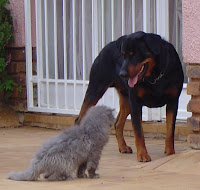To Go, Eat, Drink Conjugations
Let's see how we can use these three verbs in three different tenses in Serbian:
DANAS | JUČE | SUTRA | |
IĆI | - Sada idem u prodavnicu. - Mama i ja obično idemo u bioskop petkom. | - Išla sam u prodavnicu juče. - Išao sam sa mamom u bioskop prošlog petka. | - Ja ću ići u školu sutra u 8 ujutro. - Deca u Kanadi će ići u školu od septembra. |
JESTI | - Šta radiš sada? Jedem burek.A ti? - Sada ne jedem. I ja isto jedem burek, ali samo vikendom. | - Jeo sam juče burek. - Juče sam jela picu. | - Ja ću jesti sarmu sutra. - Ješćemo sarmu sutra. - Sutra ćete jesti sarmu. |
| PITI | - Hoćeš nešto da popiješ? Ne hvala, upravo pijem Fantu. - Ljudi u Srbiji piju puno vode. | - Pili smo mleko kad smo bili deca. - Nisam pio mleko već šest godina. | - Popiću kaficu kad stignem kući. |
 |
| Slažu se kao pas i mačka :) |
I really recommend Marina as an online teacher. She provides comprehensive lessons combining study and fun. You never know what to expect next so you never get bored. She's a professional who knows how to transfer knowledge to others.
Edita, Poland, 2008
She is the best teacher of Serbian as a Foreign Language! She is patient and loves teaching. I recommend Marina as teacher! Ioanna, Greece, 2009
I'm loving this course so far and am enjoying the examples. I like how much you learn in such a short time.
Mandy Southgate, South Africa, 2010
Marina is brilliant. Her classes are filled with a positive feeling atmosphere, which makes me feel comfortable and relaxed. I have thoroughly enjoyed our lessons, and thus have made noticeable and swift inroads with my progress. I look forward to many more lessons in the coming weeks. Vladan, Australia, 2011
The course is great and the teacher as well, the problem is on my side in relation with my availability, but marina has been always nice and professional in meeting my requests. i'd suggest this course to everyone who is interested in learning Serbian. Antonio , Italy, 2011
Marina's lessons are extremely well planned, highly interactive and challenging - I am making great progress with the Serbian lessons.
David, England, 2012
Marina is so flexible and helpful when you want to learn about a specific topic! She customizes the lessons to suit your needs and interests! She always makes me feel as though I am improving and I always feel challenged and excited for her classes - the classes always fly by!
Jayme, USA, 2013
Marina has been a fantastic teacher. She has taken me from knowing absolutely no Serbian and brought me to a level where I am excited to live and thrive in a country where they speak Serbian. I have recommended her and will continue to pass her name along for other students who are interested in learning. I look forward to continuing to keep in touch with her. Katie, USA, 2014
I have been working with Marina twice a week through Udemy since late August and LOVE her and all of her videos and classroom work through Udemy. It is so helpful to be able to log in at any time during the day or night and listen and watch her videos. She breaks each lesson down very well and makes it simple to learn and to interact and practice on my own before our classtime. I will highly recommend Marina to other friends as well as Udemy! Amanda, USA, 2015
Marina is a great teacher. She always supports me in everything I need. All my questions or doubts are immediately responded by her. I recommended this course and Marina!! Mirko Radović, Peru, 2016
I have worked with Marina as a teacher of Serbian for several years and highly recommend her based on her passion for Serbian and for language in general, as well as her total commitment to teaching and to her students. David, UK, 2017
Marina is an incredible teacher of Serbian language; she knows how to motivate a student, she is very resourceful, and uses a great variety of learning approaches. Hours spent with her are never dull. Highly recommended! Jana, Slovenia, 2018
Happy Easter = Srećan Uskrs with a new exercise based on this beautiful song: Serbian Easter - Vaskrs & Uskrs Ljudi Likujte Check ...
